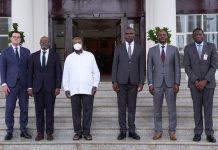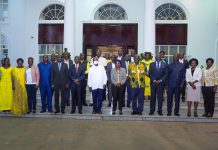By Maurice MUGISHA;
There has been a raging debate over the enforcement of a presidential directive on advertising by government entities.
According to the directive, all government advertising must be through UBC TV and New Vision given the tight resource envelope.
The Permanent Secretary and Secretary to the Treasury Ramadhan Ggoobi while communicating the directive to government agencies recently warned them against defying the order.
Now, the National Association of Broadcasters has threatened to boycott the coverage of government activities.
It’s unfortunate that the NAB has chosen the path of ‘blackmail’ instead of dialogue over the matter given the reality on the ground pertaining to the media industry.
Let me share some data which highlights broadcasting Advertising (AD) spend by Government Vs Private Sector.
According to the latest Ipsos NAM research, broadcasting (Television and Radio) only attracts less than 10% of the overall advertising spend in Uganda from Government. 90% of AD spend is by the private sector namely; Telecom (15%),Corporates (15%), Banking (10%), Beverages (18%) and others (private sector) – 20%+.
I took a deep study of the industry and a source at one of the top 2 TV stations says only 2% of their advertising revenue is from government advertising with them. That’s advertising from Ministries and Agencies of Government. 98% of their advertising revenue is from the private sector, NGOs and Development Partners who support different campaigns across different sectors.
One of the top 3 radio stations in Kampala, only generates on average 10% of their monthly revenue (sh30 million), from government advertising.
Both Television and Radio command 94% of all advertising spend overall, according to Ipsos.
Therefore, if the Government is spending under 10% across both platforms, why the boycott of Government activities?
Unless some media houses have ‘unique’ and ‘special’ frameworks with Government Agencies that benefit them at the cost of others in the market.
Due to cuts in public expenditure across all sectors/programmes, Government had no budget allocated for advertising in the last 2 quarters of Financial Year 22/23.
There were some exceptions, for example, Ministry of Health was supported (100%) by development partners on their TB/Malaria campaigns across all media platforms.
I have shared on different forums how the private sector relies on reputable research firms like IPSOS to determine their AD revenue spend across different media houses. I have always argued that the data unfairly ranks UBC given that the National Broadcaster has a different mandate.
The Corporate companies like Telecoms spend over 98% of their advertising revenue on private media. We have never boycotted covering their activities.
For example, one of the top private TV stations is contracted at sh80m (monthly) by a Telecom company and the same Telecom is advertising with UBC at a paltry sh15m (monthly) for the same TV AD time.
I understand the advertising industry dynamics of TV viewership vs AD revenue that informs the AD spend. However, the private sector is already taking the lion’s share. I think it’s fair that government supports its own to build capacity and grow the industry, a better UBC and New Vision is good for the media landscape in Uganda.
We can debate the percentage of advertising revenue the government should ring-fence for the private sector, but it should be evenly distributed across the 216 private licensed radio stations and 79 licensed private TV stations, not just a handful of stations.
Home News Featured Stories A closer look at advertising revenue unveils an interesting reality in Uganda’s...























